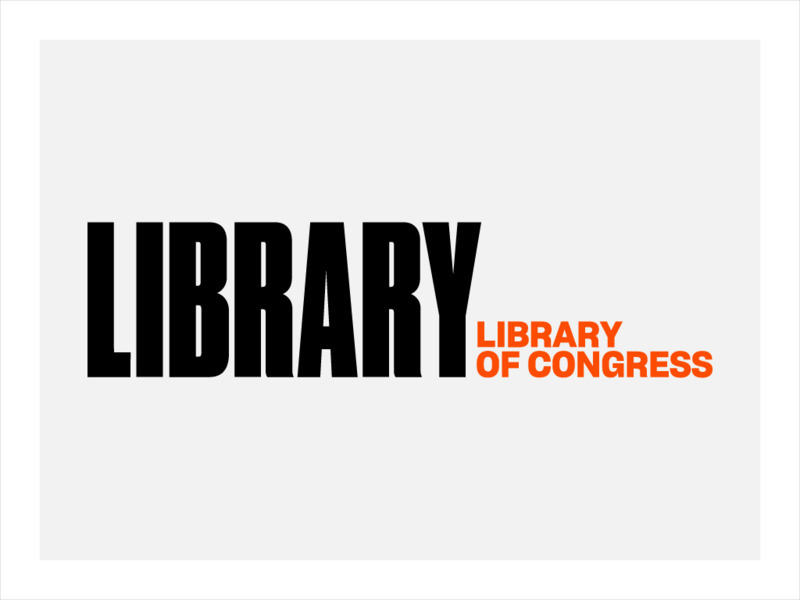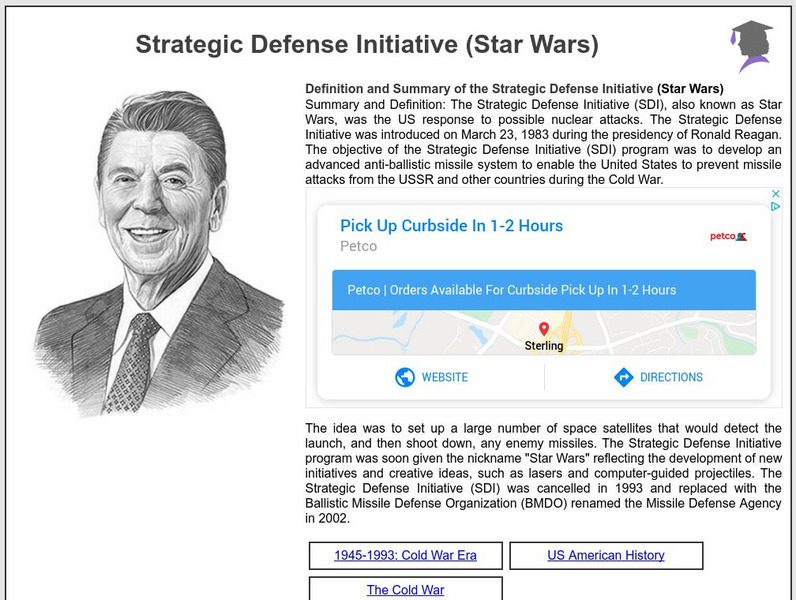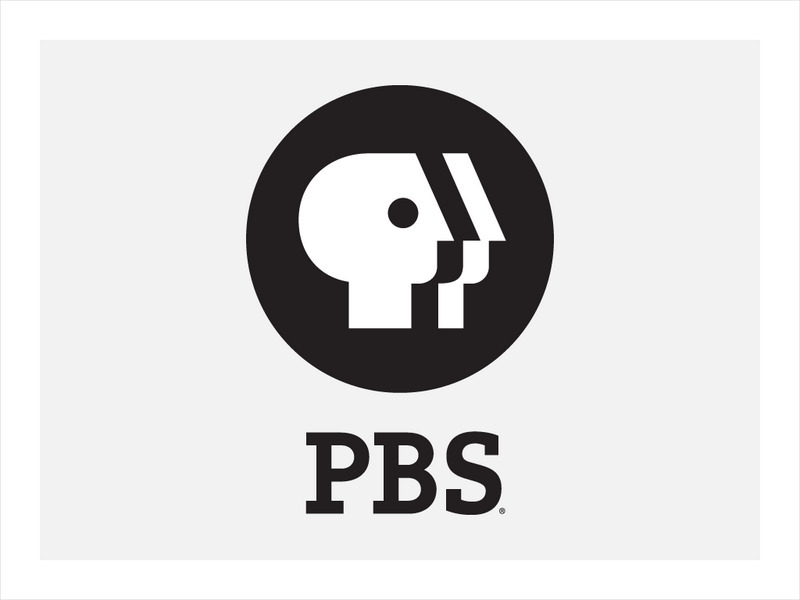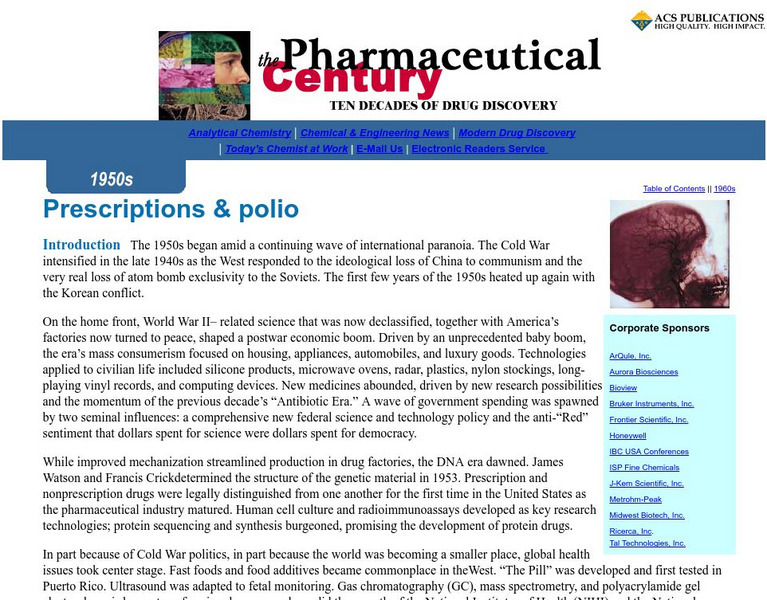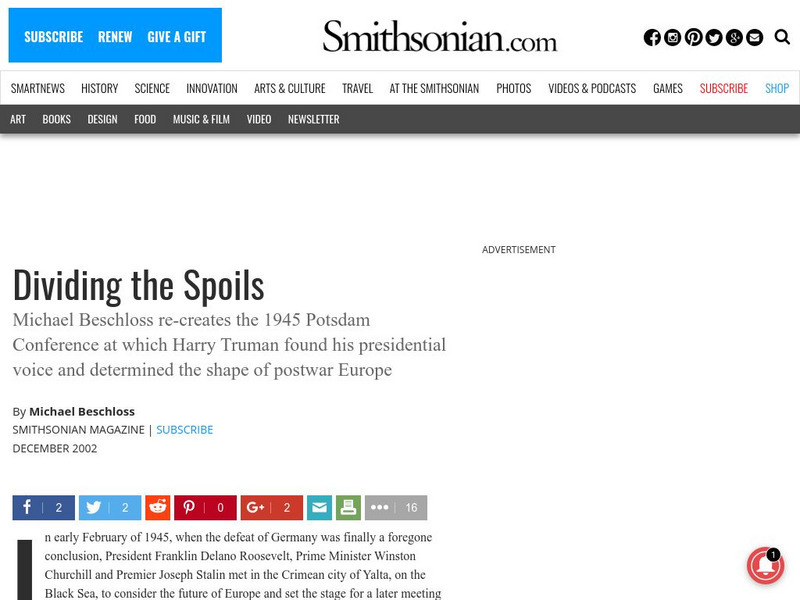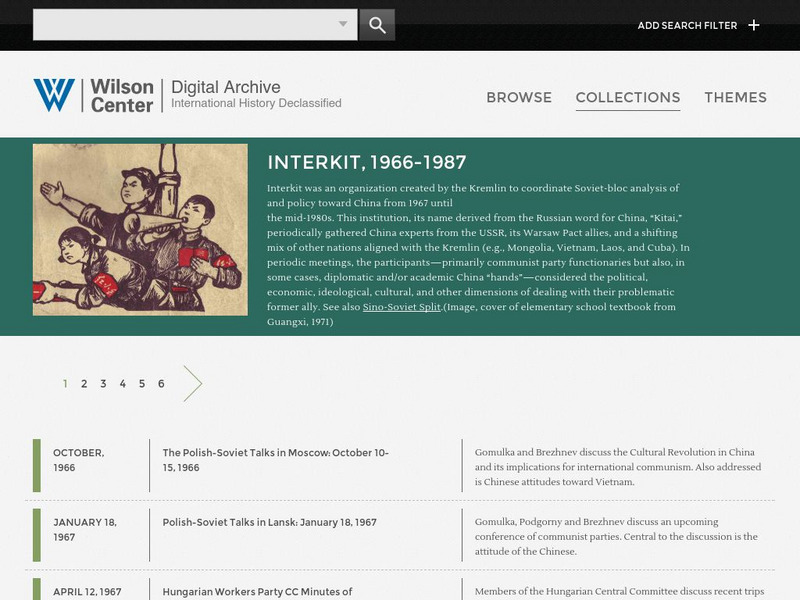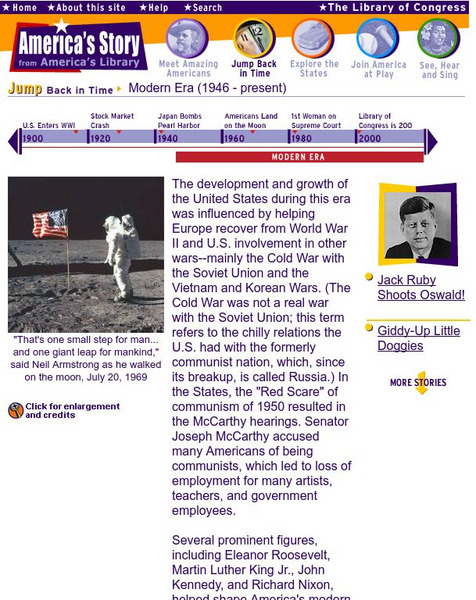Ducksters
Ducksters: World War Ii for Kids: After Wwii Post War
Kids learn about the history of what happened after World War II. How Europe and Japan recovered. Post war, plus the start of the Cold War.
A&E Television
History.com: What Caused the Korean War and Why Did the Us Get Involved?
The Korean War (1950-1953) was the first military action of the Cold War. It was sparked by the June 25, 1950 invasion of South Korea by 75,000 members of the North Korean People's Army. The line they crossed, the 38th parallel, was...
Library of Congress
Loc: Cold War Cuban Missile Crisis
This site details the placing of intermediate-range nuclear missiles in Cuba by the Soviet Union. The article discusses why Khrushchev did this, and what the U.S. did about this. Also provided is the text to Krushchev's letter to JFK...
Siteseen
Siteseen: American Historama: Strategic Defense Initiative (Star Wars)
The Strategic Defense Initiative (SDI) was the United States response to possible nuclear attacks set up to develop an advanced anti-ballistic missile system to enable the United States to prevent missile attacks from the USSR and other...
Federation of American Scientists
Fas: Soviet Union Security Concerns
This article examines the Soviet Union's concerns about its sphere of influence during the Cold War and its desire to protect its interests.
Other
Calvin College: German Propaganda Archive (East Germany)
This site provides links to primary source Cold War propaganda from East Germany.
Country Studies US
Country Studies: Latvia the Soviet Period
This article details the occupation of Latvia by the Soviet Union following World War II and during the Cold War.
Country Studies US
Country Studies: Lithuania the Soviet Republic
This article discusses the Soviet Republic that existed in Lithuania during the Cold War.
PBS
Pbs: American Experience: Truman: Foreign Affairs
This site gives a great overview of the early Cold War under President Truman. Describes relations with the Soviet Union, the atomic bomb, actions in western Europe, and the Korean War. A great piece that gives the reader a fantastic...
Read Works
Read Works: Truman and His Doctrine: Revolutionary, Unprecedented, and Bipartisan
[Free Registration/Login Required] This 5-page PDF is the nonfiction article "Truman and His Doctrine: Revolutionary, Unprecedented, and Bipartisan" by Elizabeth Edwards Spalding which discusses Truman's policy to provide aid to Turkey...
Tate
Tate Liverpool: Picasso: Peace and Freedom: Educator's Pack [Pdf]
Art historical context and analysis of an exhibition of Picasso's work on the artist's interest in representations of war and peace during the cold war period [Tate Liverpool, 2010]. This illustrated educator's pack, though designed to...
BBC
Bbc: Truman Doctrine and Marshall Plan
This article details the significance of the Truman Doctrine and the Marshall Plan, focusing on how these documents demonstrate the growing tensions between the United States and Russia during the Cold War. Archived.
Country Studies US
Country Studies: The Polish People's Republic
This article discusses the Soviet Union's influence in Poland following World War II and during the Cold War.
American Chemical Society
The Pharmaceutical Century: The 1950s
This extensive review of the advances in medical research and technology in the 1950s credits the Cold War and Cold War thinking with promoting scientific research and government funding of that research, including medical issues. Find...
Department of Defense
Do Dea: Ap Us History: Unit 9: Modern Times
This extensive learning module examines the extent to which conservatism successfully challenged liberal dominance in American culture and politics, and redefined economic policies and political behaviors. It looks at how the end of the...
Other
Southwestern Academy: Eisenhower's Foreign Policy [Pdf]
A well-organized look at President Eisenhower's Cold War policies throughout his two terms as president. Find out about his policies toward the USSR, Latin America, Asia, and the Middle East.
Smithsonian Institution
Smithsonian: Dividing the Spoils
Historian Michael Beschloss discusses Harry S. Truman's role in the Potsdam Conference and examines how his decisions there paved the way for the Cold War. (December 2002)
Woodrow Wilson International Center for Scholars
Woodrow Wilson Center: Digital Archive: Interkit, 1966 1987
A collection of primary source documents surrounding the Interkit Story. These documents give insight into policy coordination and national interests in the Soviet Bloc in the second half of the Cold War.
PBS
Pbs Learning Media: Huac and Hollywood
This video and support materials detail the Hollywood blacklist and House Un-American Activities Committee, chronicling the fear of Communism and resulting blacklist based on political ideology. The video is from the American Masters...
PBS
Pbs Learning Media: Huac: Backlash and Implications
These videos and support materials explore the intense division experienced by those who testified before and blacklisted by HUAC during the Cold War, focusing on the testimony of Elia Kazan. The videos are from American Masters None...
Wikimedia
Wikipedia: Self Determination
This site defines self-determination and discusses how the concept evolved throughout World War I, World War II, and the Cold War. Looks at issues related to self-determination and cases of countries around the world that sought...
PBS
Pbs American Experience: Race for the Superbomb
This site explores the Cold War race to develop the hydrogen bomb, a weapon that would change the world. Content details all the people who were involved in the race for the H-Bomb, as well as notable events during this time period....
Library of Congress
Loc: America's Story: The Modern Era
For a brief overview of the period after World War II until the present, visit this Library of Congress resource. Learn about the Cold War and the first man to walk on the moon.
US Department of State
U.s. Department of State: Decades of Change: 1960 1980
Summary of the rise of cultural and ethnic pluralism that took place in America between 1960 -1980 causing major social change. Included were such movements as civil rights, women, Latino, Native-American, counterculture,...




